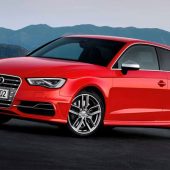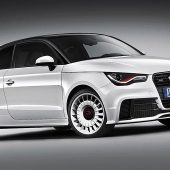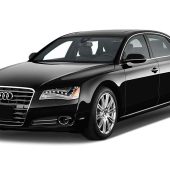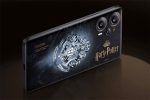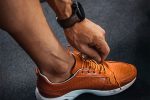The heart of the Audi A1 clubsport quattro is a classic Audi gasoline engine – a five-cylinder unit displacing 2.5 liters with turbocharging and direct fuel injection. Compared with the version used in the Audi TT RS and RS 3 Sportback on which it is based, the output of the TFSI has been increased dramatically to 370 kW (503 hp) and 660 Nm (486.79 lb-ft) of torque. Maximum power is available between 2500 and 5300 rpm. The turbocharger, intercooler, admission tract and the exhaust line have been systematically tuned for high performance. As on the Audi A4 DTM, the tailpipe is located on the left flank, just in front of the rear wheel.
Another area where the A1 clubsport quattro shines is its overall weight of just 1390 kilograms (3,064 lb). The powerful engine catapults the car from 0 to 100 km/h (62.14 mph) in 3.7 seconds. From 0 to 200 km/h (124.27 mph) takes just 10.9 seconds, while the car goes from 80 to 120 km/h (49.71 to 74.56 mph) in fourth gear in just 2.4 seconds. A six-speed manual transmission and quattro permanent all-wheel drive, both taken from the TT RS and enhanced, deliver the power to all four wheels. Top speed is governed at 250 km/h (155.34 mph).
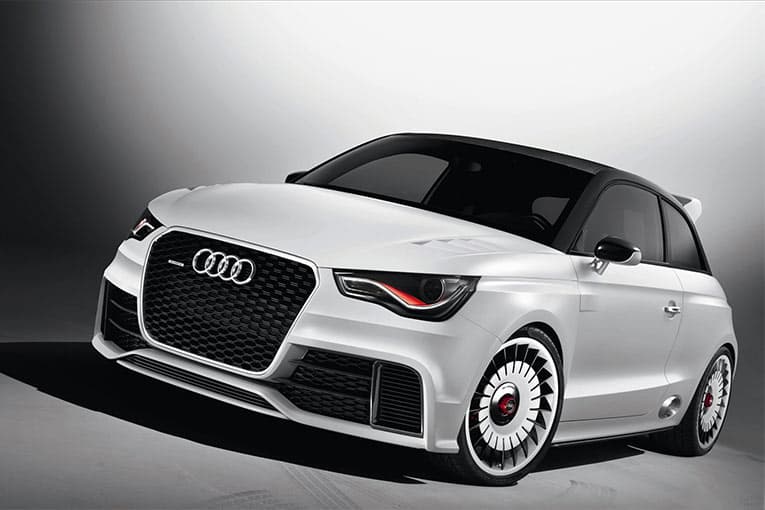
The Audi showcar rolls on 255/30 low-profile tires mounted on 19-inch alloy wheels with a unique turbine design. Sitting behind the wheels are large, internally ventilated disc brakes. Up front, six-piston calipers grab perforated carbon fiber-ceramic discs. Large steel discs are mounted on the rear axle. The coilover suspension of the A1 clubsport quattro features adjustable compression and rebound damping.
Exterior
Sporting a very dynamic appearance and an exquisite finish, the showcar makes no secret of its potential. The body has a Glacier White matt paint finish, with accents provided by many add-on parts. The roof arch in high-gloss black supports a roof made of carbon fiber-reinforced polymer (CFRP), and the four rings at the front of the car are solid aluminum. Large, split air intakes with carbon struts are integrated into the distinctively modified front skirt. The single-frame radiator grille sports a black honeycomb design, and the headlights feature matted clasps with a red “wing.” Heat from the engine compartment is dissipated via two large air outlets in the hood.
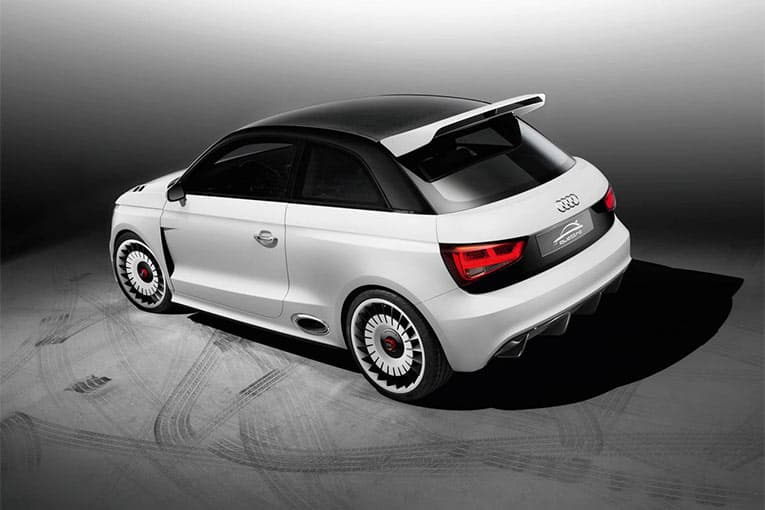
The front fenders, the doors and the rear side panels of the Audi A1 clubsport quattro have been widened by a total of 60 millimeters (2.36 in). They form horizontal “blister” edges, like those found on the Audi Ur-quattro. Air outlets are integrated into the rear ends of the fenders, and the newly designed trim strips on the sills are made of exposed CFRP. Sleek side mirrors are reminiscent of the Audi R8 high-performance sports car. The rear of the showcar is dominated by the roof spoiler, which features a double wing to provide for sufficient downforce. Darkly toned rear lights and a large, closed diffuser hone the rear view of the A1 clubsport quattro.
Interior
Designed as a road vehicle for the race track, the showcar has no rear seat. In its place are a large crossbar to further stiffen the body and storage for racing helmets. A weight-optimized starter battery used in racing is mounted in the rear below the two storage compartments. The strict high-performance concept left no room for an infotainment system, an MMI monitor or even a loudspeaker. The lightweight bucket seats are taken from the Audi R8 GT and feature a chassis made of carbon fiber-reinforced polymer. Red four-point belts secure the driver and passenger.
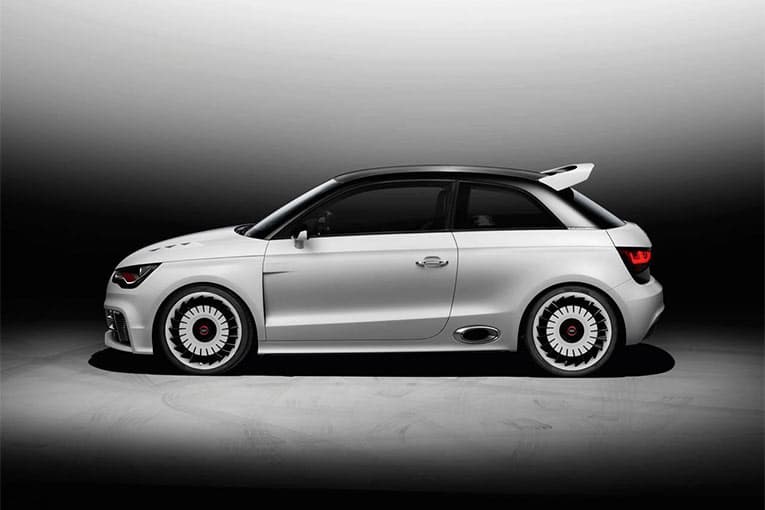
The interior of the showcar is a study in dark gray. Large areas are covered with exposed, matt-finished CFRP, including the walls in the rear section of the car, the tubes of the air vents and the “stern of the yacht” in the lower section of the center console. The CFRP material used on the open-spoked sport steering wheel is covered with leather. Rocker switches on the center console replace switches on the control stalk and in the door panels. Three additional instruments indicate the oil pressure, boost pressure and electrical system voltage. The center console and the seats are covered in fine leather upholstery with tone-on-tone stitching. The selector lever is made of aluminum; the caps of the pedals and the surface of the footrest are made of stainless steel. Red loops replace the handles on the doors, the glove box and the covers of the storage compartments.

